Global Voices Online is very active when it comes to covering the way freedom of speech is being threatened in Brazil. Of these threats, the Digital Crimes Bill, known as the Azeredo Bill, and the discussions over the Electoral Reform Law are considered by the blogosphere as ways of trying to restrict the rights of ordinary citizens on the web. In this post, we meet one of the most influential cyberactivist bloggers in Brazil, the man responsible for the most successful campaign to fight censorship on the Brazilian web, the Mega Não movement [pt].
João Carlos Caribé, popularly known just by his last name, is a born activist [pt]. In his own words: “Activism is part of my DNA—I'm an incurable idealist. The deeper we dig, the more we learn and the angrier we become; sometimes ignorance is bliss.”
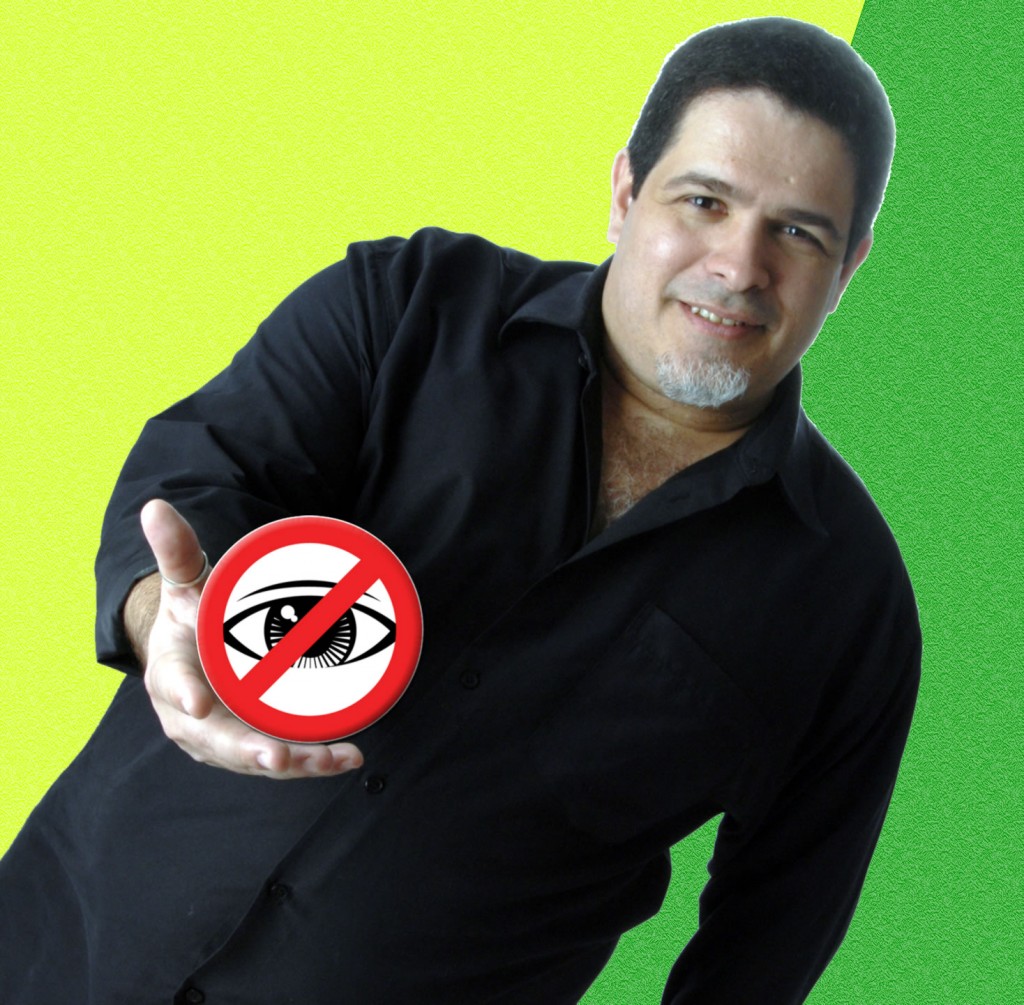
Caribé, with the colors of the national flag in the background. The logo represents the Mega Não movement, and was designed by Mario Amaya.
Caribé dreamed of being a superhero and protecting the weak and oppressed since he was a boy, and this childhood ideal has matured over time. He has found various outlets for it, whether in the fight for freedom of speech on the internet, through voluntary teaching, or in his relentless criticism of social media; he says it is impossible to stay still when there are so many distractions. And he is irreverent, as we can see from his Twitter profile:
Procura no Google! Eu falo palavrão, sacanagem e xingo politicos, siga por conta e risco.
Who is Caribé?
My inner scientist leads me to deconstruct established social, economic and cultural frameworks and simulate their obsolescence in order to answer the question “what comes next?” Right now I work in advertising, but in the past I've been a DJ and worked in engineering, systems analysis and O&M. I've always enjoyed a challenge. I'm an incurable idealist!
How long have you been blogging, and how many blogs do you take part in?
Despite working with the internet since 1996, I only created a blog at the end of 2002. It was called Ex-Gordo [pt]. In 2005 I started my personal blog, Entropia! [pt]. By the beginning of 2006, I had created the group blog Propaganda & Marketing [pt] and at the end of the same year I created another group blog when I first heard about the Digital AI5 and the Azeredo Bill; the blog was called Xô Censura [pt]. We might consider this blog the beginning of my involvement with Brazilian cyberactivism. In 2007 I created the group blog Perspectiva [pt], which is a network for providing and publicizing projects to create opportunities for children and teenagers, and soon after that, in 2008, I created the Blog Cidadão [pt] and the Ciberactivism Network [pt] on Ning. At the beginning of 2009 I was invited by Sérgio Amadeu (who also supports the Mega Não campaign) to be part of the group blog Trezentos (300) [pt], after which I created Mega Não [pt], which aims at being a meta-manifesto, and has far exceeded my expectations.
Between 1996 and 2002 I was involved with other internet projects. In 1996 I started a personal website where I published many posts about management and technology. In the following year I started Flash Brasil [pt], a community that worked with Macromedia Flash. Unawares, I was creating a business model that would lead us to become one of the top 5 resellers of the product, capturing the attention of the Macromedia Marketing vice-president, who began citing Flash Brasil as a successful case study. This got me an invitation to give a speech to an audience of over one hundred network leaders from all over the world in NYC in 2001. Apart from that, 2001 was a kind of baptism of fire, because towards the end of the year internet usage expanded and seriously affected my business. Nevertheless, Flash Brasil still gets a considerable number of visits, with more than 500,000 hits per month.
How did you become a cyberactivist? And what form does this take? (question by Conceição Oliveira on Twitter)
It was more of a natural evolution than a complete transformation. Activism is in my DNA. I'm an incurable idealist. The deeper we dig, the more we learn and the angrier we become; sometimes ignorance is bliss. I felt that I was really making a difference when I devoted myself to volunteering. Currently I don't have enough time to carry on volunteering, but I miss it, since it’s so rewarding; it’s great therapy, and a foil for depression.
In 2006 I heard of the Digital AI5 through Omar Kaminski —a Brazilian lawyer renowned for matters relating to new technology and the law—in the cyberculture community in Orkut. The bill was proceeding through the Senate and was going to be voted in on November 8th, 2006. I jumped in and we did what we called a protest-o-matic, which was a kind of form that anyone could fill in to send a message to all the senators. More than 3000 emails were sent in less than 24 hours, the bill was not passed and the senators decided to hand it over to other committees.
Since then, I literally taught myself about politics, and through studying I started to recognize clear political strategies. I now saw a world that I had never come into contact with before, one that I could never even have imagined. In the process, I met other cyberactivists and I noticed that the internet is a world of new horizons, where I could live out all those fantastic theories like collective intelligence, crowdsourcing, the cluetrain manifesto, and many others.
I have almost never participated in activism outside the world wide web. I believe that cyberactivism— what many critics call “armchair activism”—is much more powerful, rapid and efficient. It just needs to be consolidated with face-to-face activism so that the “analog critics” are able to understand it. Besides a spot of anarchist activism in my college days, the only public demonstrations I have taken part in were the Mega Não in Rio de Janeiro and (via Skype) in Rio Grande do Sul.
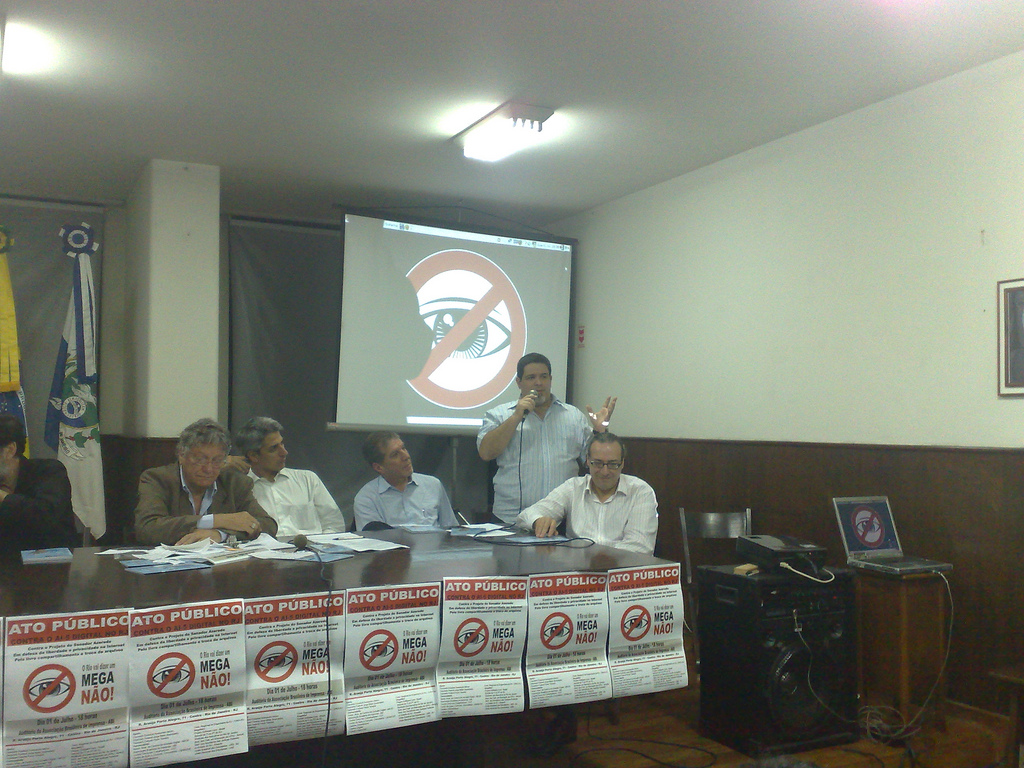
Caribé gives a speech about the Mega Não and censorship on the internet during a public demonstration in Rio de Janeiro. Henrique Antoun is on his left. On his right are Federal Deputy Jorge Bittar and Deputy Alessandro Molon.
Please talk about the Mega Não. How did the idea behind the movement come about?
Mega Não was a case in which I targeted the rabbit, but ended up hitting the elephant. Digital AI5 was being processed rapidly and gaining momentum within the Chamber of Deputies. We felt the urge to do something broader, something ‘mega’, and I came up with the idea of creating the Mega Não. The initial proposal was to create a sequence of online and offline events that would direct people and audience to the Mega Não movement. I discussed the idea with Daniel Pádua, who contributed lots of interesting ideas, and it really took off. Nevertheless, it took a great deal of dedication to bring the project to fruition. After we came up with the idea of the public demonstration in São Paulo, I decided we would make this our grand finale. Time was not on our side, so the blog was made in a hurry and isn’t as we originally envisaged it. Throughout this process, we were greatly helped by Antonio Arles and Myris Silva.
The name “Mega Não” was perfect, and rapidly became synonymous with cyberactivism against the Digital AI5. The idea of transforming it into a meta-manifesto was crucial for making it a source of information about activism. It was made in a hurry by those involved, but it turned out to be rather good. It spread rapidly via social media, and the blog now receives a decent number of visits, and it is cited on other blogs.
-
Developed by several Brazilian activists alongside João Carlos Caribé, the movement has already reached the ears of the EFF (Electronic Frontier Foundation), with a blog post on the Brazilian President Lula's recent statement about the Azeredo Bill and its impact on Brazilian politics.
You’re heavily involved in Brazilian cyberactivism. What motivates you to fight for freedom on the internet? (Question by Antonio Arles on Twitter)
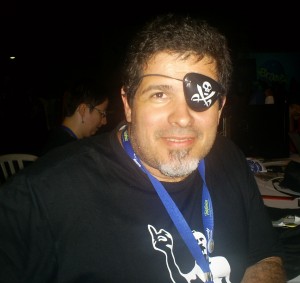
"Caribbean Pirate". Photo by @_thebest_
One reason is my incurable idealism. I suppose the other is my passion for this cause. I was born and raised under the aegis of censorship, but nowadays we have a bit more freedom. The internet allows the voice of the ordinary citizen to be heard. Anyone can produce anything on the Internet, because it has put an end to the economy of scarcity, it has democratized knowledge, it allows people to relate to one another through ideology or other affinities, and it gets rid of the middleman.
As it says in the Free Culture Manifesto, the internet is a window of opportunity for society to bring about a great revolution at all levels. We are paving the way for “social capitalism”, a system based on both wealth and sharing, and that scares the establishment.
There is a covert war against this social movement, provoked by the big oligopolies, corrupt and repressive governments, banks, cultural industries, deceptive mainstream media, and others who are interested in keeping the status quo. My struggle, my passionate motivation is to maintain the benefits that the internet has already provided, and to extend them.
What do you think of the Brazilian blogosphere?
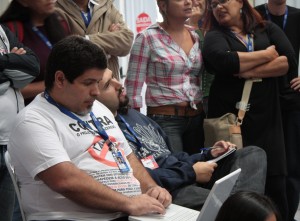
Caribé's Twitter bio: "Just google me! I swear, use dirty words and curse politicians. Follow me at your own risk."
“Brazilian blogosphere” is a complex term. For most of the media outlets and publicity agencies, the national blogosphere boils down to a dozen well-visited blogs. For me, it is a complex network of prosumers and their views, and a very diverse one at that.
In our cyberactivism against the Digital AI5 we had a hard time trying to find out what motivated other bloggers to join the cause. We believed that few of them would stick with it. One of our ideas was a collective blogging exercise, with many participants blogging on the same subject, and I was surprised to see that it had resulted in more than 180 blog posts on wildly differing types of blog. Even the most narcissistic bloggers have stuck with the cause. That actually changed my way of seeing blogs, and I became more respectful and understanding towards the reasons that people blog, even the “cry-baby” types.
What changes can really be brought about by promoting cyberactivism?
Lots of changes are already taking place; many are openly obvious, while others are more subtle. For instance, we could mention the increasing politicization of web-savvy people, as I remarked in this blog post [pt] in Trezentos:
[..] Estamos pensando e agindo coletivamente, estamos nos “alfabetizando politicamente”, estamos reconhecendo nossos direitos, aprendendo a valorizar o próximo e, estamos aprendendo, como diz Dalai Lama que: uma enorme jornada começa com um pequeno passo. Podemos não perceber isto agora, mas nunca mais seremos os mesmos, estamos reconstruindo a história da democracia no Brasil, somos os agentes de mudança, dificilmente seremos enganados novamente, somos os revolucionários digitais, estamos fazendo a revolução mediada por computador, a revolução da era da participação […]
In addition to this “political literacy”, we can see real change. Our cyberactivism against the Digital AI5 convinced thousands of skeptics that the Azeredo Bill was a wolf in sheep's clothing and would not solve the cybercrimes issue, but would turn the internet into an inhospitable environment. Barely a single Brazilian media outlet covered the demonstrations against the Digital AI5, which is clear proof that the facts are being manipulated. They cover cybercrime stories almost every day, in addition to their soap operas, while contain propaganda in favor of the Digital AI5.
Even without mainstream media coverage, we reached around 15 million Brazilians and hundreds of thousands of foreigners. With our cyberactivism we provided a platform for politicians who were sympathetic to the cause to defend our interests in Parliament. Our online petition [pt] with more than 150,000 signatures has become a symbol of cyberactivism against the Digital AI5. I believe that our movement accelerated the adoption of social media by our politicians, and we are now seeing a version of the “Emperor's New Clothes” in our Senate. The ignorance of parliamentarians towards the internet and its usage makes them look ridiculous, stark naked in front of connected society.
I’d say that we did more than simply change the content of the bill and its course through the committees. We helped to expose the “nudity” of Parliament. This will eventually help us get rid of political dinosaurs, to be replaced by far more audacious and committed politicians who are committed to society and a better future for our nation. The political dinosaurs have already realized their weaknesses, and that’s why they are insisting on mild censorship for the 2010 elections. But they won’t succeed. The window of opportunity is already open, and it’s can’t be slammed shut once again.
How do you picture the Brazilian internet in 10 years?
This is a good exercise for the imagination. It’s impossible to predict only one scenario, though; we need several. I'll stick to two: one in which freedom of speech prevails, and the other in which vigilantism takes root.
In general terms, I believe that in 10 years we won't have the same internet as we do today. There will be free access to the world wide web through any technological device, and interconnected networks will increase the density and scope of the internet. We will live inside it. Our cars, refrigerators, cookers, toilets, shoes, lamps, electronic devices; everything will be connected. We will carry data in our bodies that will be available to any surface provided with a virtual interface. A chopping board, for instance, will be able to be used as a computer, as will our car windshields.
As everything will be integrated, we’ll know what type of maintenance our cars need before a problem occurs, or be able to check the refrigerator from anywhere we are to see whether there’s enough cheese and wine to invite our friends to dinner. If there’s not enough food, the refrigerator computer will make a list and send it to the supermarket with the best value. We will only need to authorize the purchase.
Secure open source mechanisms will ensure that these transactions between devices and humans will be safe and inviolable. Those who have bet on the semantic web, the “uniqueness” of the internet, will be disappointed. The semantic web, where scripts would connect and produce content from existing content that has proved too mechanized, will exist, but it won't exclude other creative processes. Creativity and the importance of the human touch on the internet will continue. People will still want to talk to each other—remember the old Cluetrain Manifesto.
If vigilantism prevails, however, it will be on the peripheries of the internet. And since the internet is so wide-reaching, this censorship will be recognized as harmful and will be destroyed with the help of those who instigate the backlash. There will be a harmless struggle between connected society and vigilantism, and the former is bound to come out on top. I think it unlikely that vigilantism will prevail; in countries where people are not reacting to the censorship of the Internet they will eventually react even more explosively. Total control of the internet is impossible in China; the rest of the world will be no different.
In this way, connected society will exercise greater discernment when electing its representatives, dismantle the frameworks that benefit from censorship, and wake up from this nightmare, in which companies, coup-mongering media outlets, corrupt politicians and others who backed this status quo tried to keep society alienated and under their control. The establishment will gradually be superseded by a utopia, and we will have succeeded in creating a better world.
What would you say to convince someone who does not believe in the “power” of blogging?
I think it’s more appropriate to talk about the power of a connected society. Some people still believe that computers are alienating, that they affect people's relationships and “damage little children”. People are free to believe anything they want. Many believe in the “good intentions” of the Digital AI5, in Santa Claus, the Easter Bunny and in neoliberalism. To deal with those beliefs means not only showing that there are other options, but also picking apart the arguments of the person you want to convince. The more conservative the person is, the harder this will be.
For instance, Senator Eduardo Azeredo still says that the criticism of the Digital AI5 is foolish, and the result of misinterpretation. He even seems to believe in a vertical intelligence system, and it’s obvious that he doesn’t have a clue about collective intelligence, or other distributed or horizontal intellectual systems. How would I go about convincing someone like this of the power of connected society? Actually, I think that we’ve already convinced him, but he hasn’t realized it yet, and maybe he never will. Maybe the 2010 elections will change his mind?
–
As an influential figure in Brazilian cyberactivism, Caribé is an inspiration for many new bloggers in Brazil. Many bills, laws and judicial decisions that try to censor the internet are proliferating in this country, and people like him are more than welcome. They are necessary to defend the spirit of democracy on the internet as a basic right, not a fallacy sponsored by controversial politicians and deceptive media outlets.


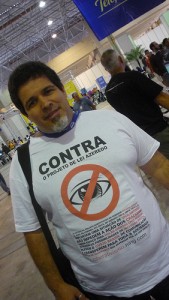






4 comments